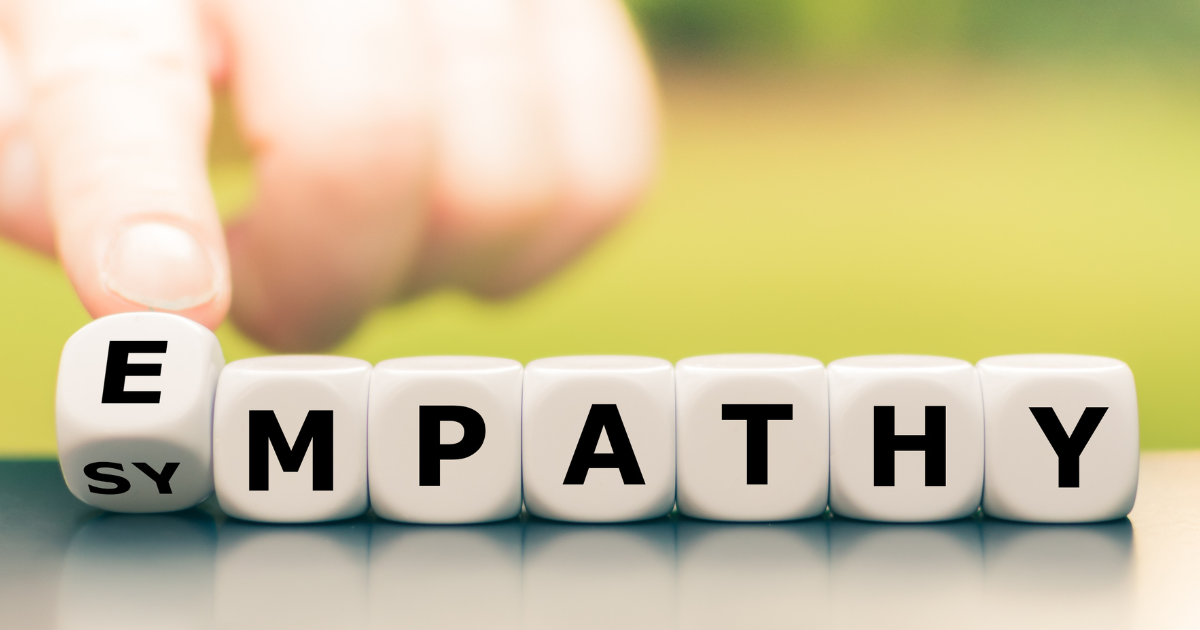What’s the difference between Sympathy and Empathy being a Caregiver?
Caregivers extend their role beyond providing physical assistance to the elderly, becoming companions, confidants, and pillars of support in their lives. When faced with difficult situations, recognizing the distinction between sympathy and empathy becomes crucial. Both sympathy and empathy are valuable, but empathy, in particular, allows caregivers to connect with their elderly clients on a deeper level. This blog explores the contrasting aspects of sympathy vs. empathy and how cultivating empathy can enhance caregiving experiences. Follow along as we examine the characteristics of each as well as sympathy vs empathy to see how these two terms can be easily confused.
Sympathy: A Distant Yet Well-Intentioned Response
Sympathy involves recognizing and acknowledging another person’s suffering or hardship. When caregivers sympathize with elderly clients, they express concern and offer consolation. However, sympathy often remains distant, lacking the emotional connection necessary for profound understanding. While sympathy is well-intentioned, it may inadvertently lead to a sense of separation between caregivers and those they care for, because it’s inadvertently saying “I recognize and acknowledge your situation, but I don’t understand it.”
Empathy: Building Bridges of Connection
Empathy, on the other hand, goes beyond the surface level. It involves caregivers putting themselves in the shoes of their elderly clients and sharing their emotional experiences. Empathy is about genuinely understanding their struggles, fears, and joys, and validating their feelings. By cultivating empathy, caregivers can bridge the gap, establish trust, and build strong emotional connections with their clients. This can sound like, “I understand the difficulties you’re experiencing, and I’m here for you.” When expressing empathy, a stronger bond can form between the client and caregiver that will be better for both parties.
Practicing Empathy as a Caregiver
To cultivate empathy, caregivers must actively engage in several practices. Firstly, listening attentively to clients’ stories and experiences is vital. Active listening is so important! It makes the client feel heard and valued. By doing so, caregivers gain insight into their lives and the emotions they navigate. Secondly, caregivers must practice non-judgment and suspend their own preconceived notions. This enables them to fully understand clients’ perspectives and refrain from imposing their own beliefs onto their experiences. Remove any biases that you may have when a client speaks to avoid projecting any negative emotions that would deter the client from opening up again.
Navigating Difficult Situations with Empathy
Caregivers often encounter challenging situations with elderly clients, such as coping with loss, physical or cognitive decline, or emotional distress. Empathy becomes a valuable tool in navigating these circumstances. By demonstrating genuine understanding and compassion, caregivers can support clients through their struggles, helping them find solace and acceptance in difficult times. Empathy can be extended to the family members as well if they are experiencing the loss of the client. When this happens, which one do caregivers default to? Sympathy vs empathy? Sometimes it can be a mix of both, switching back and forth between “I understand.” and “I can sympathize.” Sometimes we may not know entirely what people are feeling, but if caregivers can remain open-minded and cognisant that both sympathy and empathy are important in these situations, they can be very successful in connecting to clients or family members of the client.
The Benefits of Empathy for Caregivers
While empathy is pivotal in providing exceptional care, it also benefits caregivers themselves. Engaging in compassionate caregiving fosters personal growth, emotional resilience, and increased job satisfaction. Empathy enables caregivers to develop a deeper sense of purpose, finding fulfillment in the meaningful connections they forge with their clients. This can help them in their daily lives, being able to connect to others more deeply.
Sympathy vs Empathy in Caregiving and Life
Sympathy vs empathy both come from a good place with good intentions, but empathy is a deeper more meaningful place of understanding. Imagining someone else’s situation can really rocket a caregiver into understanding the needs a client may have for remaining independent, keeping their dignity, and being treated respectfully. Sympathy can feel more removed, as if a caregiver feels bad for their situation, but they don’t understand nor do they want to place themselves in the client’s shoes. This can lead to problematic encounters and relationships when the client doesn’t feel heard. Being heard and having a caregiver actively listen to their problems can create a close bond. By knowing the differences and crossover of sympathy vs empathy, caregivers can have more successful relationships with clients and others in their life. It may help them understand themselves more too.
Caregivers commit to a role that goes beyond practicalities, and embracing empathy can create transformative caregiving experiences. Nurturing a profound connection with elderly clients not only improves their quality of life but also enriches the lives of caregivers. Let empathy guide caregivers as they embark on this noble journey of care and compassion, understanding the significance of sympathy vs. empathy in providing holistic care to elderly clients. If you’re interested in learning more about our services, please check out our website to learn more. We’re your resource.






